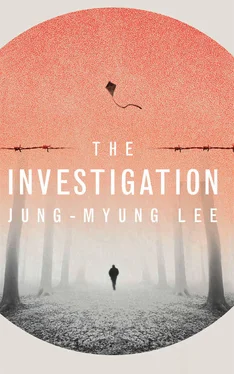Prisoner 645 sat straight-backed on the old wooden chair in the interrogation room. The humidity-spotted walls accentuated his gaunt, pale face. He was slight in his too-large prisoner uniform. I assumed an impassive demeanour as I flipped through the file, but I was feeling anxious. I told myself to calm down; Hiranuma was the one who should be worried.
‘Did you catch the murderer?’ he asked.
His question knocked the breath out of me. I’d already lost my authority. I took off my sweat-soaked military cap and decided to confide in him. There was no way he would tell me the truth if I didn’t. ‘It was a prisoner named Choi Chi-su. He killed the guard when his escape plot was discovered.’
Hiranuma nodded. Dark shadows were cast under his nose and on his stubbly chin. The bruise on his eye was turning yellow. ‘So you got the murderer. What do you want from me?’
‘I have the facts, but not the truth.’
He scanned my face. ‘Facts and truth. ’
I recalled Rilke’s book of poems in his box of confiscated books. ‘It was a fact that Rilke died from being stuck by a rose, but that wasn’t the truth. The thorn caused blood poisoning that spread bacteria throughout his body, but that wasn’t the cause of death. It was leukaemia. On the other side of a fact lurks another truth.’
‘You don’t say?’
‘Yes. He wrote his own headstone to say: “rose, o pure contradiction, desire to be no one’s sleep beneath so many lids”. That is suggestive of the secretive essence hidden on the other side of a beautiful rose.’
He searched my face. My argument was, in essence, revealing to him the kind of person I was; he was reading me as I sat in front of him.
I made an effort to regain the terse tone of an interrogator. ‘Why did Sugiyama Dozan copy out your poems?’
He shook his head. He looked firm — he couldn’t, or wouldn’t, tell. Noting my disheartened expression, he spoke, with the finality of scattering wet dirt into an open grave. ‘Accept the facts that have been revealed. The truth only makes everyone suffer.’
I shook my head violently as if to fling off the wet dirt. The wall in front of me swayed like a thin, undulating piece of paper. ‘Even if it’s presented as the truth, a lie is a lie. A little knowledge is a dangerous thing.’
He hesitated. ‘What is it that you want to know about Sugiyama Dozan?’
‘His life.’
‘Not about his death?’
‘I need to know about his life to understand his death. Only when I know how he lived will I be able to know why he died.’
‘It would be easier to ask your fellow guards about his life. Why are you asking me, of all people?’ Hiranuma seemed anxious to leave as soon as possible.
‘Because you’re the one person who really knew him.’
He studied me carefully. After a long time he replied in a calm voice, ‘He was a poet. He was the most wonderful poet I’ve ever met.’

Sugiyama Dozan was a poet. But not at first. At the beginning he was quite different. He despised literature and looked down on those, like Hiranuma, who believed they could make something out of words.
Hiranuma came to Fukuoka Prison in the spring of 1944. With fourteen other men he stepped behind walls that aged him instantly. Exhaustion and fear grew like liver spots on his face, his bones protruded, the heels of his sockless feet cracked and the back of his frost-bitten hands chapped. With dim eyes he gazed at his reality — the barbed wire, the bars and the thick steel doors that blocked his vision. He was puzzled as to why he was here, dragged in by a few lines and a couple of documents — his banned Korean poems, police reports, the prosecutor’s indictment and the judge’s ruling. At Fukuoka he moved slowly, passing through the shadows of the tall watchtower and the cold brick walls. He went into the disinfection room and was doused in white powder. He was given an old prisoner uniform. He wondered whether the person who’d worn it before him had left this place alive. He walked along the long corridor into the musty unknown, his own feet crushing his consciousness. Cell 28, Ward Three. That first night he hunched in a corner like a crumpled piece of paper as despair soaked into his marrow.
The Korean prisoners were clustered together at the sunny spot below the wall, when they heard a thin, smooth, wind-like whistling. Sugiyama slid the club out of his belt and looked for the source. It was Prisoner 645, standing at the foot of the bare hill. Sugiyama’s steps instinctively quickened into a run.
‘645! What are you doing here, all alone?’ Sugiyama’s voice, out of breath, was on edge. He aimed his club at the young man’s neck, ready to break his shoulder.
645 stopped whistling. ‘Is it a crime to whistle?’ he asked gravely, his voice sinking like sediment.
This young man was everything Sugiyama derided: a recalcitrant Korean political prisoner who violated the Maintenance of Public Order Act, and an intellectual on top of that. With the tip of his blood-crusted club, Sugiyama pushed the young man’s chin up. ‘Listen carefully. This is Fukuoka Prison and I’m Sugiyama Dozan. You’re behind bars. You can’t whistle. And you certainly can’t write.’
‘So what can I do?’
‘It would be easier to ask what you can’t do.’
‘Then what can’t I do?’
‘You can’t do whatever it is you’re trying to do right now!’ Sugiyama’s teeth were set on edge. A flock of black crows flew up noisily into the ashy sky.
‘One’s heart can’t be incarcerated or taken away.’ 645’s voice rustled like a leaf in the wind, lustreless, tired and trembling.
Sugiyama despised the educated. They were arrogant, and clueless. With their puny words they sucked off someone else’s sweat and tears, mumbling nonsensical poems and reciting unintelligible phrases. ‘No lies and exaggerations and sweet talk allowed here. This is Fukuoka Prison, and I’m watching your every move.’ Sugiyama swung, and his club landed heavily on 645’s shoulder; the young man fell to the ground, his shoulder dislocated.
He looked up at Sugiyama, his face contorted in pain. Sugiyama was struck by the look in the prisoner’s eyes — they were filled with pity, not resentment.
Back in his office, Sugiyama flipped through the log of confiscated items. 645. Hiranuma Tochu. The log showed that he had an unpublished poetry collection, The Sky, the Wind, the Stars and Poetry , thirty additional poems and a total of twenty-eight books. Sugiyama headed to the library. Boxes were lined up on the shelves. Sugiyama opened Hiranuma’s box. He saw faded titles on dirty, well-worn covers; books by Fyodor Dostoyevsky, André Gide, Francis Jammes, Rainer Maria Rilke and some Korean writers. He spotted a bundle of paper shoved into one corner.
The Sky, the Wind, the Stars and Poetry .
Cautiously, as if he were searching an enemy camp, Sugiyama turned the first page. And with stern eyes he glared at the neat strokes:
PROLOGUE
— The Sky, the Wind, the Stars and Poetry
Let me look up to the heavens
Without a speck of shame
Until the day I die.
I was in agony
Even from the wind rustling among leaves
I shall love every dying being
Singing of the stars
And I shall walk
On the path given to me.
Tonight too the stars brush against the wind.
These average, nondescript sentences pummelled Sugiyama’s temples. How could ten lines make him breathless and dazed? He didn’t realize that reading a single poem was equivalent to getting to know the world inhabited by the writer, expanding his senses beyond the usual five. He stuffed the manuscript back in the box. He wanted to flee — from this man, his writings, this poem. Sugiyama was firm in his belief that writing was a contaminant; it ruined people, concealed weak spirits and unmoored pity, ridiculous optimism and foolish dreams. Writers led an idle life in the name of romance, dazzled by clever lines, infected by anarchism. Poets believed they could change people and the world. Sugiyama straightened his guard cap. He would banish this absurd poem that flickered its evil tongue. He banged the square, long-handled stamp onto the manuscript:
Читать дальше













